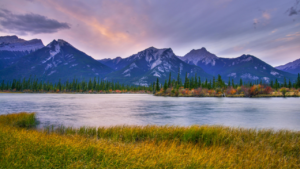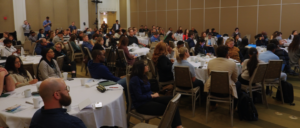Contributed by Angelina Fedorenko
We’re excited to announce a new partnership with the Future Skills Centre on the future of Canada’s sustainable blue economy. As part of this partnership, we’ll be working together to identify opportunities for workforce mobility, diversification of the blue economy’s workforce, and bridging Canadians to in-demand occupations.
The primary focus of the project, Development of Canada’s National Occupational Standards for a Sustainable Blue Economy, will be to document the competencies of SBE workers across the following six subsectors: fisheries and aquaculture, ocean technologies, offshore minerals and resources, marine renewables, marine transport, ports, and shipping, as well as coastal and marine tourism.
The National Occupational Standard profiles developed will align the scope of future SBE employment opportunities with existing and upcoming talent. Consideration will be given to disadvantaged and under-represented groups to ensure that the emerging sector reflects Canada’s diverse and multicultural population.
This project comes at a time where Canada’s ocean economy is seeing vast growth that’s expected to continue as Canada transitions from the traditional ocean economy to the Sustainable Blue Economy (SBE). This is a worldwide trend with the global ocean economy projected to double in size by 2030. The World Bank describes the reinvention of this sector as “the sustainable use of ocean resources for economic growth, improved livelihoods and jobs, and ocean ecosystem health.”[1]
For Canada, a country with a vast coastline that spans the Atlantic, Pacific, and Arctic shores, this abundant access to ocean waters, together with recent investments in advanced oceanic technologies, provides a wealth of opportunities for the sustainable use of ocean resources.
Canada’s ocean sector currently employs 300,000 workers, and growth in the sector will create additional opportunities in junior, mid-, and senior-level positions.[2] Fortunately, the variety of sustainable opportunities will allow for workers from the traditional ocean sector to transfer their existing skills and knowledge to the SBE.
However, support will be needed to bridge gaps and quell uncertainties among existing employers, as well as to supply the necessary resources to sector newcomers and the outcomes of this project aim to help.
The research and development of project outputs will involve a variety of stakeholders including existing partitioners, academia, government, Indigenous groups, SBE enterprises, and industry associations. As the project unfolds, the information gathered will be shared publicly to promote the implementation of the project’s results in the emerging SBE sector.
Project success will be measured by means of the stakeholder survey report, workforce transition plan, skills-building framework, and competency recognition framework, among many other project outputs.
To keep up to date with this project, follow us on social media and sign up for our monthly newsletter.
[1] Fisheries and Oceans Canada. (2021, June 16). Government of Canada. BES engagement paper. Accessed October 3, 2021, from https://www.dfo-mpo.gc.ca/about-notre-sujet/blue-economy-economie-bleue/engagement-paper-document-mobilisation/part1-eng.html.
[2] Canada, F. and O. (2018, September 20). Canada’s environment, oceans and energy ministers announce concrete action to advance economic progress through health sustainable oceans at G7. Canada.ca. Accessed October 4, 2021, from https://www.canada.ca/en/fisheries-oceans/news/2018/09/canadas-environment-oceans-and-energy-ministers-announce-concrete-action-to-advance-economic-progress-through-healthy-sustainable-oceans-at-g7-mini.html.



